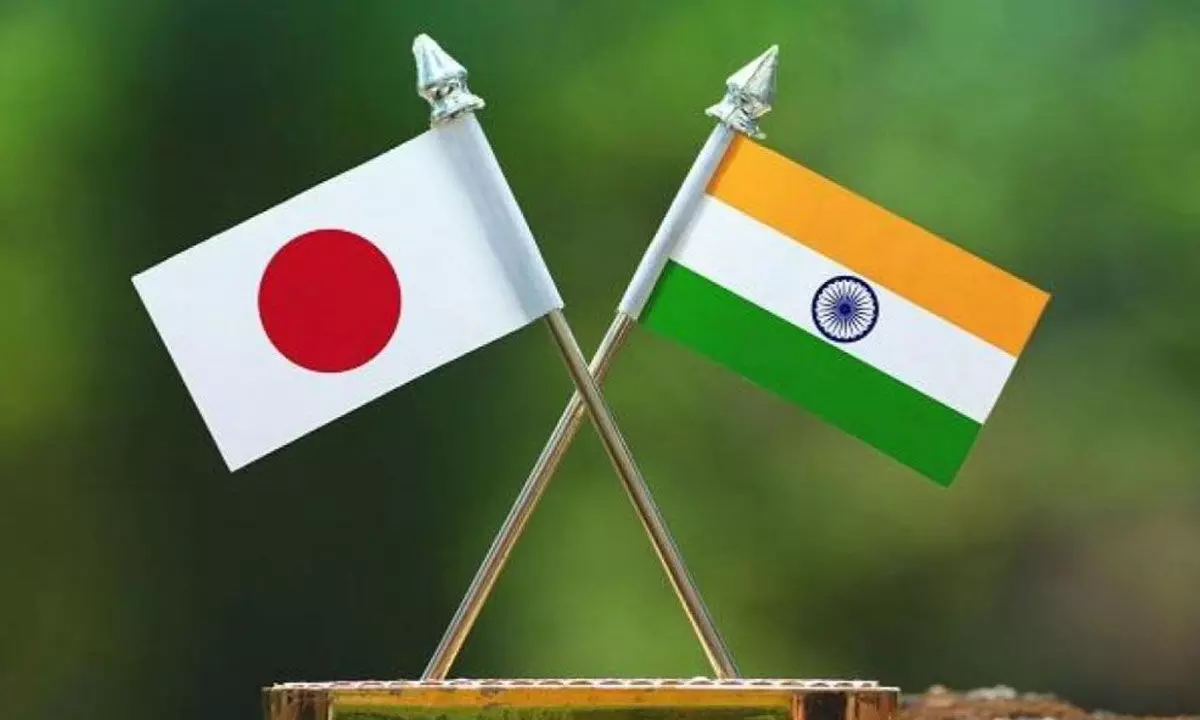Need for closer Indo-Japanese ties

Need for closer Indo-Japanese ties
There is consensus on both sides that a strong India-Japan relationship is very important for a free, open, rule-based and inclusive Indo-Pacific based upon sovereignty and territorial integrity of nations.
There is consensus on both sides that a strong India-Japan relationship is very important for a free, open, rule-based and inclusive Indo-Pacific based upon sovereignty and territorial integrity of nations. India's Indo-Pacific Oceans Initiative (IPOI) shares many commonalities with Japan's Free and Open Indo-Pacific (FOIP). India has also developed maritime cooperation with regional partners in consonance with our inclusive vision of Security and Growth for All in the Region (SAGAR).
Japan and India, along with Australia and the United States, are members of the Quad group of countries that hold annual naval exercises across the Indo-Pacific region to demonstrate interoperability. Both India and Japan are members of Quad, G20 and G-4. They are also member countries of the International Thermonuclear Experimental Reactor (ITER).
India, like Japan, is bolstering its military to tackle what it sees as increased security threats. Both countries are increasingly wary of China's growing military might and assertiveness. China claims almost all the energy-rich waters of the South China Sea, where it has established military outposts on artificial islands. In the East China Sea, China claims a group of uninhabited Japanese-administered islets.
India, which last week commissioned its first home-built aircraft carrier, is involved in a standoff with Chinese forces on their remote Himalayan border. The last meeting of Quad leaders, in May in Japan, was dominated by discussion about Taiwan after US President Joe Biden angered China by saying he would be willing to use force to defend the democratic island. As they met, Russian and Chinese warplanes conducted a joint patrol in the region.
The participation of Japan for the first time in the multilateral exercise MILAN and the operationalization of the Reciprocal Provision of Supply and Services Agreement in March this year are milestones in the progress of defence cooperation between our Forces. We are happy to note that our Air Forces are working closely on the early conduct of the inaugural Air Force fighter exercise, says Rajnath Singh, Defence Minister.
He adds, enhancing the defence equipment and technological cooperation between India and Japan is one of our key priority areas. In our meeting today, I had the opportunity to propose engagements in emerging and critical technological domains. I have also invited the Japanese defence companies to look at opportunities in investing in the Indian defence corridors.
India and Japan defence forces organize a series of bilateral exercises namely, JIMEX (naval), SHINYUU Maitri (Air Force), and Dharma Guardian (Army). Both countries also participate in Malabar exercise (Naval Exercise) with the USA and Australia.
JIMEX 22 involves two Phases; exercises at sea and a harbour phase at Visakhapatnam. This edition marks the 10th anniversary of JIMEX, which began in Japan in 2012. It also coincides with the 70th anniversary of establishing of diplomatic relations between India and Japan. JIMEX 22 seeks to consolidate the high degree of interoperability that exists between maritime forces of the two countries, through complex exercises in the surface, sub-surface and air domains.
Both sides should also work jointly towards implementing their decision to have 5 trillion yen in public and private investment and financing from Japan to India in the next five years.
India highlighted the steps taken by it to improve ease of doing business, logistics through the 'Gati Shakti' initiative and urged Japan to support greater investments by Japanese companies in India. Such investments would help in creating resilient supply chains and would be mutually beneficial.
India appreciated that Japanese companies are increasing their investments in India and that 24 Japanese companies had successfully applied under the various Production Linked Incentive schemes. Both Countries noted the progress in implementation of Mumbai-Ahmedabad High Speed Rail project and welcomed the signing of exchange of notes of the 3rd tranche of loan for this project.
Both the countries have agreed to encourage greater collaboration between private sectors of both sides in the development of next generation communication technologies. They also agreed to deepen cooperation in the area of Clean Energy including green hydrogen. They took note of the progress in implementation of the Specified Skilled Workers (SSW) programme and agreed to further scale up this programme, boosting people to people linkages.
Way Forward
More collaboration and cooperation can prove beneficial to both nations, since India needs sophisticated technology from Japan. There is a huge potential with respect to Make in India. Joint ventures could be created by merging Japanese digital technology with Indian raw materials and labour. Close cooperation is the best measure to combat China's growing role in Asia and Indo-Pacific, in physical as well as digital space.














